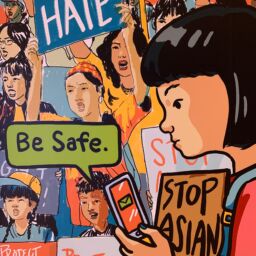- No products in the cart.

Domestic Violence Around The World
BY: Amanda Hildreth
Domestic Violence can affect anyone, but how it manifests itself may be different depending on the setting in which it occurs. Societal acceptance within a culture can play a large role in the survivor’s decision to leave an abusive situation. Societal acceptance of Domestic Violence is widespread among many developing countries, with 36% of people believing it is justified in certain situations (University of Bristol, 2018).
How Cultural Views Affect Victims
Cultural norms shape people’s perceptions and expectations of relationships and marriages. For example, in cultures such as Asian, African, and Middle Eastern societies, marriage is seen as a communal affair with an emphasis on family satisfaction. As a consequence, those in these societies may face intense pressure to maintain the relationship, regardless of any Domestic Violence they may be experiencing (Perina, 2023).
For example, a study performed in South Africa revealed women in the region have the cultural belief of “lebtila la mosadi ke bogadi” which translates to “ a woman’s grave is at her husband’s house,” which affects their decision to leave a relationship where they are experiencing Domestic Violence (Perina, 2023).
Countries Without Domestic Violence Protection
Unfortunately, even in this modern age, many countries lack the laws to protect against Domestic Violence. These countries often experience more than 300 cases daily (Sawe, 2018).
Countries without any Domestic Violence protection include (Sawe, 2018):
- Congo
- South Sudan
- Iraq
- Iran
- Ivory Coast
- Myanmar
- Chad
- Swaziland
- Burkina Faso
- Cameroon
- Morocco
- Guinea
- Estonia
- Russia
- Qatar
- Gabon
- Eritrea
- Djibouti
- Niger
- Haiti
- Egypt
- Oman
- Syria
- Sudan
- United arab emirates
- Bahrain
- Afghanistan
- Mauritania
- Yemen
- Palestine
- Uzbekistan
- Armenia
- Mali
- Liberia
- Lesotho
- Libya
- Tunisia
- Togo
- Micronesia
- Algeria
- Tanzania
- Kenya
- Kuwait
Several factors, including religious beliefs, taboos, and cultural beliefs, are some of the leading causes of a lack of laws around Domestic Violence in these countries. In countries in the Middle East, for example, it is taboo for women to report any form of violence they may experience. Further, the lack of reported cases makes it difficult to create laws against Domestic Violence because of improper support from communities. These laws may also vary from community to community, with no common law on Domestic Violence. Many authorities in these areas even oppose laws on handling Domestic Violence (Sawe, 2018).
Most of the offices responsible for these laws are dominated by men, leading most proposed laws on Domestic Violence to be rejected. Laws against Domestic Violence may be seen as an infringement on the rights of the person who committed the crime. In some countries, Domestic Violence is not seen as a crime to create a law to prevent it (Sawe, 2018).
Countries Moving Toward Change
Although many countries have no laws against Domestic Violence, some countries are moving toward change and continuing to pass new laws against Domestic Violence.
In 2016, China passed its first law making Domestic Violence a national crime and describing Domestic Violence as any Physical or Psychological Abuse against a relative or cohabiting non-relative. Jordan, Lebanon, and Tunisia have been moving toward rescinding their rape-marriage laws. Kyrgyzstan passed a law called Safeguarding and Protection Against
Domestic Violence (SPAV), which makes it easier for victims to report Domestic Violence cases with better follow-up from police. Liberia passed a Domestic Violence Act in 2019 that strengthened the protections for Domestic Violence victims, including men, women, and children, and also made it mandatory for healthcare providers, social workers, and school officials to report suspected incidents of Domestic Violence (Kraut, 2021).
How We Can Prevent Domestic Violence In Other Countries
In certain cultures, such as Eastern cultures, a lack of support, both from a legal and institutional standpoint as well as social alienation, may leave Domestic Violence victims feeling trapped in an abusive relationship. Victims may face additional barriers to resources, such as language barriers or limited knowledge of their available resources (Perina, 2023).
Through access to available and effective social support, those experiencing Domestic Violence can gather the strength to leave a violent relationship. In these cultures, continued emphasis on personal autonomy and independence provides more resources for seeking support (Perina, 2023). We must also provide services for victims that identify and understand how cultural values and norms impact each victim.
People from different cultures may also have different coping strategies. For example, Japanese-born women show increased psychological distress toward active coping strategies compared to American-born Japanese women. In these situations, speaking out against abuse may create more anxiety than the abuse itself (Perina, 2023).
Understanding the role that culture plays in how we view Domestic Violence can help us have compassion for survivors and provide us with best practices to help survivors heal.
At ARO, we are here to support your personal healing journey towards your complete well-being. We bring solutions and real-time education for 21 different types of abuses. The most prevalent abuses are Sexual Abuse, Spousal Abuse, Physical Abuse, Psychological Abuse, Narcissistic Abuse, Financial Abuse, Self Abuse, Elderly Abuse, Isolation Abuse, Child Abuse, Bullying, Cyberbullying, Workplace Abuse, Religious Abuse, Medical Abuse, Food Abuse, Authority Abuse, Educational Abuse, Child Sexual Exploitation, Sex Trafficking, and Political Abuse. Support our efforts by visiting GoARO.org and NormTherapy.com to sign up for Norm Therapist® Training to become one of our dynamic staff members who serve Victims and Survivors of abuse worldwide, schedule Norm Therapy® sessions, become a Live Stream volunteer, join our mailing list to learn how you can make an impact on the Abuse Care Community, and provide life-saving financial assistance with a generous donation.
References
University Of Bristol. (2018, October 31). Domestic violence is widely accepted in most developing countries, new study reveals. ScienceDaily. https://www.sciencedaily.com/releases/2018/10/181031141437.htm#:~:text=Overall%2C%20the%20societal%20acceptance%20of,Asia%20(29%20per%20cent).
Perina, K. (2023, July 19). How culture impacts the decision to leave abusive marriages. Psychology Today. https://www.psychologytoday.com/us/blog/non-weird-science/202307/how-culture-impacts-the-decision-to-leave-abusive-marriages
Sawe, B. E. (2018, August 15). Countries without laws against domestic violence. WorldAtlas. https://www.worldatlas.com/articles/nations-without-domestic-violence-regulation.html
Kraut, M. (2021, October 31). A look at domestic violence internationally. Los Angeles Criminal Defense Attorney Blog. https://www.losangelescriminaldefenseattorneyblog.com/a-look-at-domestic-violence-internationally/
















